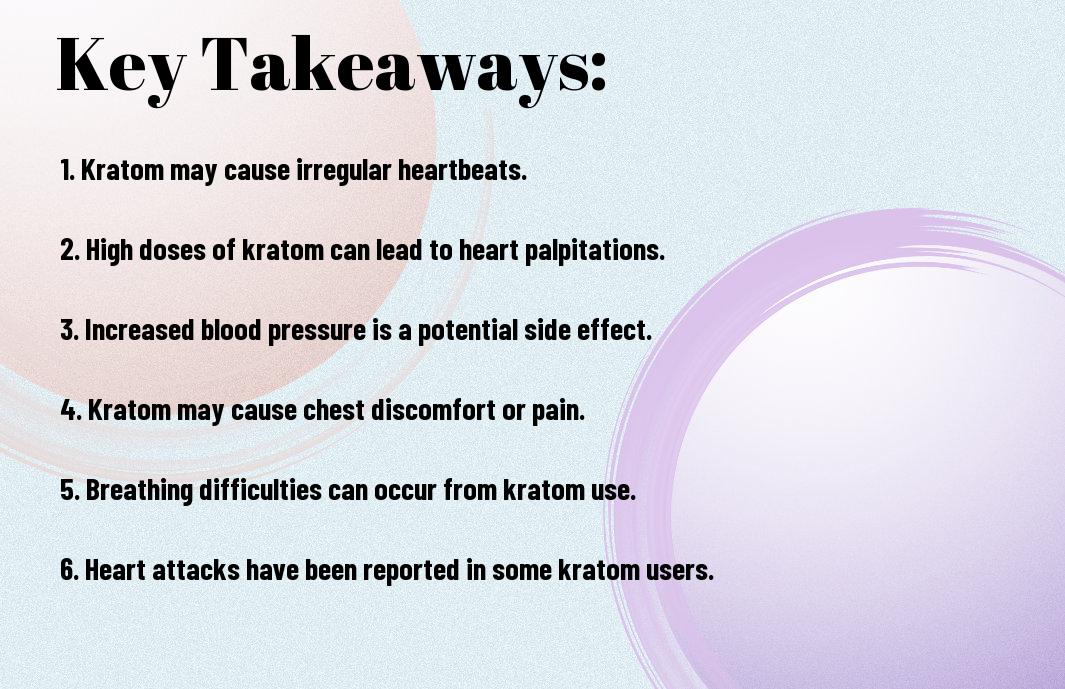Over recent years, kratom has gained popularity as a natural remedy for various ailments. However, it is crucial to be aware of the potential heart-related side effects that can arise from its consumption. While kratom’s analgesic and stimulant properties are desired by many, it can also negatively impact the cardiovascular system. Understanding these risks is important to make informed decisions about kratom use, especially for individuals with existing heart conditions.
Key Takeaways:
- Kratom may affect the heart by causing irregular heartbeats, high blood pressure, and palpitations.
- Individuals with heart conditions should avoid using kratom as it can exacerbate existing problems and lead to serious complications.
- If experiencing any cardiovascular issues after taking kratom, seek immediate medical attention to prevent any adverse effects.

What is Kratom?
To understand the potential effects that Kratom can have on the heart, it’s important to first have a clearer picture of what Kratom is and where it comes from.
Origin and History
An evergreen tree found in Southeast Asia, Kratom leaves have been used for centuries in traditional medicine practices in the region. Indigenous communities would chew the leaves or brew them into a tea for their stimulant and pain-relieving effects. It has gained popularity in Western countries more recently, where it is often used as a natural remedy for conditions such as chronic pain and anxiety.
Chemical Composition
With over 40 different alkaloids present, Kratom’s main active compounds are mitragynine and 7-hydroxymitragynine. These alkaloids interact with opioid receptors in the brain, producing stimulant and opioid-like effects. While Kratom’s chemical makeup may offer potential benefits for some individuals, it also poses risks, especially when misused or consumed in high doses.
The variations in alkaloid concentrations and the potential for contamination during production make it challenging to determine the exact effects of Kratom on the body. This variability underscores the importance of caution and moderation when using Kratom, especially considering its potential impact on the heart and other vital organs. Further research is needed to fully understand the implications of Kratom’s chemical composition on human health.
Cardiovascular System and Kratom
How Kratom Affects the Heart
Assuming you are looking to understand the impact of kratom on the cardiovascular system, it is crucial to research into how this botanical substance affects the heart. According to The Adverse Cardiovascular Effects and Cardiotoxicity of Kratom, various studies have reported on the potential cardiovascular side effects of kratom, including elevated blood pressure, tachycardia (increased heart rate), and palpitations. These effects can be concerning, especially for individuals with pre-existing cardiovascular conditions.
Potential Interactions with Heart Medications
Heart medications are crucial for managing cardiovascular conditions, and it is crucial to consider how kratom may interact with these drugs. Kratom may interact with certain heart medications, potentially leading to adverse effects or reducing the efficacy of the prescribed treatment. It is crucial for individuals using medications for heart conditions to consult with their healthcare provider before incorporating kratom into their regimen.
Medications such as beta-blockers or calcium channel blockers may interact with kratom, as both substances can affect heart rate and blood pressure. This interaction could result in unpredictable effects on cardiovascular function, emphasizing the importance of medical supervision when combining kratom with heart medications.
Common Side Effects on the Heart
Increased Heart Rate and Blood Pressure
Increased heart rate and blood pressure are common side effects associated with kratom consumption. Kratom contains alkaloids that can stimulate the sympathetic nervous system, leading to these physiological responses. For individuals with pre-existing heart conditions or hypertension, this can pose a serious risk.
Cardiac Arrhythmias
On the other hand, cardiac arrhythmias are another potential side effect of kratom use. These are abnormalities in the rhythm of the heart, which can manifest as irregular heartbeat patterns. In severe cases, cardiac arrhythmias can increase the risk of stroke or heart failure.
Heart complications from kratom use are a serious concern and should not be taken lightly. It is important for individuals consuming kratom to be aware of these potential side effects and monitor their heart health closely.
Decreased Blood Flow to the Heart
Blood flow to the heart may be compromised by kratom use, as the alkaloids in kratom can constrict blood vessels. This decreased blood flow can lead to chest pain, known as angina, and increase the risk of heart attacks in susceptible individuals.
Pressure from decreased blood flow to the heart can have detrimental effects on overall cardiovascular health. It is crucial for individuals using kratom to prioritize heart health and seek medical attention if they experience any concerning symptoms related to their heart.
Rare but Serious Side Effects
Many users of kratom may experience rare but serious side effects, particularly affecting the heart and cardiovascular system.
Heart Attack and Stroke
Heart attacks and strokes are rare but potentially serious side effects of kratom use. These events can occur due to the stimulant properties of kratom, which can increase heart rate and blood pressure. Individuals with pre-existing heart conditions or high blood pressure may be at higher risk. It is important to monitor any changes in heart rate or blood pressure while using kratom and seek medical attention immediately if any concerning symptoms arise.
Cardiac Arrest
Arrest
A cardiac arrest is a sudden loss of heart function, breathing, and consciousness. This can be a rare but life-threatening side effect of kratom use, especially in individuals with underlying heart conditions. If someone experiences a cardiac arrest, immediate medical intervention is crucial to restore heart function and prevent long-term damage.
Long-term Cardiovascular Damage
With regular and prolonged use, kratom has the potential to cause long-term cardiovascular damage. Chronic use of kratom can lead to changes in heart structure and function, increasing the risk of heart disease and other cardiovascular issues. It is imperative to use kratom in moderation and be aware of any signs of cardiovascular distress to prevent long-term damage.
It is crucial to recognize the potential rare but serious side effects of kratom, particularly those involving the heart and cardiovascular system. Monitoring your body’s response to kratom and seeking medical advice if any concerning symptoms arise is vital to ensure your safety and well-being.

Risk Factors and Vulnerable Populations
Now, it is crucial to understand the risk factors and vulnerable populations when it comes to the potential kratom side effects on the heart. Certain individuals may be more susceptible to experiencing adverse reactions from kratom, especially in relation to their heart health.
Pre-Existing Heart Conditions
Any individual with pre-existing heart conditions should approach kratom use with caution. Conditions such as high blood pressure, arrhythmias, or heart disease can increase the risk of experiencing negative effects on the heart when using kratom. It is important for individuals with these conditions to consult with a healthcare provider before using kratom to determine the potential risks and benefits.
Age and Kratom Use
With regard to age and kratom use, younger individuals may be more likely to experiment with kratom, while older individuals may have underlying health concerns. Older adults may be more vulnerable to the effects of kratom due to age-related changes in the body, including decreased organ function and metabolism. Additionally, older individuals are more likely to have pre-existing heart conditions that could be exacerbated by kratom use.
Combining Kratom with Other Substances
With the increasing trend of polydrug use, it is imperative to consider the risks associated with combining kratom with other substances. Mixing kratom with alcohol, prescription medications, or illicit drugs can have serious implications for heart health. The interactions between kratom and other substances can amplify the effects on the heart, potentially leading to adverse events such as increased heart rate, elevated blood pressure, or even cardiac arrest.
Understanding the potential risks associated with kratom use, especially in vulnerable populations, is paramount in promoting safe and informed consumption practices. It is important for individuals to be aware of the interactions between kratom and other substances, as well as the impact of age and pre-existing heart conditions on the body’s response to kratom. Perceiving the potential dangers and taking appropriate precautions can help mitigate the risks and ensure the well-being of individuals using kratom.
Can Kratom Side Effects Affect Multiple Organs, Including the Heart and Liver?
Yes, kratom liver side effects can adversely impact multiple organs, such as the heart and liver. The side effects may include hepatotoxicity, causing liver damage, as well as affecting cardiac function. It’s important to understand the potential risks associated with kratom use and to consult a healthcare professional.
Mitigating Heart Risks with Kratom
Safe Dosage and Administration
With kratom, the key to minimizing potential risks to the heart lies in responsible dosing and proper administration. It is crucial to start with a low dose and gradually increase it as needed, paying close attention to how your body reacts. By avoiding large or frequent doses, individuals can reduce the strain on the heart and lower the risk of adverse effects.
Monitoring Heart Health
Any individual considering using kratom should be proactive about monitoring their heart health. Regular check-ups with a healthcare provider can help track any changes in blood pressure or heart rate that may indicate a problem. If you have a pre-existing heart condition or are taking medications that affect cardiovascular health, it is even more important to stay vigilant in monitoring how kratom may be impacting your heart.
Mitigating heart risks with kratom requires a comprehensive approach that involves safe dosing practices, regular health monitoring, and awareness of potential interactions.
Avoiding Interactions with Other Substances
One of the critical aspects of minimizing heart risks when using kratom is avoiding interactions with other substances that could exacerbate any potential issues. Substances like alcohol, stimulants, or prescription medications that affect heart function should be used cautiously and ideally avoided when consuming kratom. These interactions can increase the strain on the heart and lead to complications.
Administration of kratom should always be approached with caution, especially for individuals with underlying heart conditions or those taking medications that may interact with kratom. Consulting with a healthcare provider before using kratom can help mitigate potential risks and ensure a safe experience.
Summing up
On the whole, while kratom has gained popularity for its potential medicinal benefits, it’s important to be aware of its potential side effects on the heart. Kratom can have a range of impacts on cardiovascular health, including increased heart rate, elevated blood pressure, and potential risk of arrhythmias. These effects can be particularly risky for individuals with pre-existing heart conditions or those taking medications that affect heart function.
It’s crucial for users to be informed about the potential risks associated with kratom use, particularly when it comes to heart health. Consulting with a healthcare provider before using kratom, especially if you have a history of heart issues, is recommended to ensure your safety and well-being. Monitoring any changes in heart rate or blood pressure while using kratom and seeking medical attention if you experience any concerning symptoms is crucial in protecting your cardiovascular health.
FAQ
Q: What are the common side effects of kratom on the heart?
A: Kratom can have various effects on the heart, including increased heart rate, palpitations, high blood pressure, and in some cases, even arrhythmias.
Q: Can kratom cause long-term damage to the heart?
A: Prolonged and heavy use of kratom may lead to long-term damage to the heart, such as increased risk of cardiovascular diseases, heart failure, and other cardiac issues.
Q: How does kratom impact blood pressure?
A: Kratom can cause fluctuations in blood pressure, leading to both hypertension and hypotension depending on the dosage and individual reaction to the substance.
Q: Are there any warning signs of heart issues related to kratom use?
A: Warning signs of heart problems due to kratom use may include chest pain, shortness of breath, irregular heartbeat, fainting, and swelling in the legs or ankles.
Q: When should someone seek medical help for kratom-related heart problems?
A: It is crucial to seek immediate medical attention if you experience severe chest pain, rapid or irregular heartbeat, difficulty breathing, fainting, or any other serious symptoms that may indicate heart complications from kratom use.









